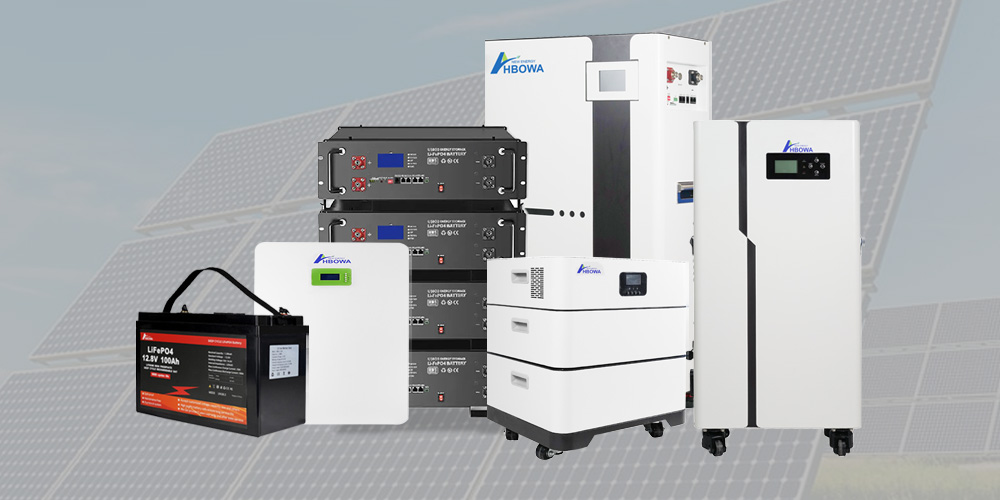Nowadays, solar batteries are becoming popular in the solar panel power system. What are the types of solar batteries? How many types of solar batteries? What are the applications of the solar batteries? How do you choose the right solar batteries for your application? In this article, we will discuss this in detail.
What Are Solar Batteries?
Solar batteries are important parts of solar power systems. They play a role in storing the electricity energy generated by the solar panels for electricity use at night or when there is no stable power output from the utility grid. Solar batteries can help to increase the reliability of the solar panel system.
Different Types of Solar Batteries
Common types of solar batteries for solar systems include lead acid batteries, lithium-ion batteries, lifepo4 batteries, nickel-cadmium batteries, flow batteries, and saltwater batteries. They each have their own advantages and suitable application cases.
- Lead-Acid Batteries: These are the most traditional type of batteries and are often used in off-grid solar systems. The lead acid solar battery is affordable and reliable but requires regular maintenance.
- Nickel-Cadmium Batteries: These batteries are rechargeable battery that use nickel oxide hydroxide and metallic cadmium as electrodes. They are robust, and can operate in extreme temperatures, and can deliver high currents with a long lifespan. They are less common in residential solar systems but are used in some commercial applications.
- Flow Batteries: These are a type of rechargeable battery where energy is stored in liquid electrolytes. They have a long lifespan and can be fully discharged without damage, are ideal for large-scale stationary energy storage applications due to their scalability.
- Saltwater Batteries: These are a newer type of battery that uses saltwater electrolytes instead of the toxic materials found in other batteries to store and release electrical energy. They are environmentally friendly and safe, but currently have limited availability and capacity, and lower energy density than lithium batteries. Application cases include storing energy from renewable sources like solar.
- Lithium Batteries for solar: Known for their high energy density, high efficiency, low maintenance, and long lifespan, lithium ion solar battery is lighter and more compact than the lead-acid battery in appearance. Lithium-ion solar batteries are becoming increasingly popular in solar power storage
- Lifepo4 Battery For Solar: Lithium iron phosphate batteries for solar are different from other lithium solar batteries in materials and are considered to be safer, longer cycle life, less expensive than other lithium-ion batteries. The detailed advantages are shown below:
- Safety: The lifepo4 batteries have a more stable crystal structure and phosphate-based cathode material than common lithium batteries.
- Long Cycle Life: Lifepo4 batteries can be charged and discharged more times before their performance degrades than common lithium batteries.
- Cost: Lifepo4 batteries are less expensive than lithium-ion batteries using lithium cobalt oxide, lithium manganese oxide, and lithium nickel manganese cobalt oxide chemistries.
HBOWA New Energy provides various kinds of lifepo4 lithium battery types, such as lead acid replacement batteries, rack-mounted lithium batteries, wall-mounted lithium batteries, stacked lithium batteries, floor-mounted lithium batteries, and all-in-one lithium batteries. If you have any requirements, feel free to contact us for more details.
What are the applications of the solar batteries?
Solar batteries are widely used for storing power in solar systems, application cases include:
- Residential Home Solar System;
- Commercial and Industrial Use;
- Off-grid solar systems(Types of solar systems: off-grid, on-grid,hybrid);
- Emergency Backup Power;
- Public Utilities.
How to Choose the Right Solar Batteries for Your Application?
Solar batteries are various, and how to choose the right solar batteries for your application, here are some tips for your reference.
Solar Battery Capacity
Battery capacity is one of the important factors when choosing solar batteries. The capacity is measured in Kilowatt-hours(KWh). It means the energy that the battery can store, so when you select solar batteries, first consider the energy that you need.
Cycle Life
The cycle life of solar batteries means the number of charge and discharge cycles a battery can undergo before its capacity degrades significantly. In the long run, you’d better choose batteries with long cycle life, so that we can use them for a long time.
Efficiency
Battery efficiency is marked as a percentage and means the ratio of the amount of energy that can be stored in the battery compared to the energy that is put into the battery. Higher efficiency of the solar batteries means high energy power can be stored in the battery with less energy loss.
Cost
When choosing solar batteries, the cost is an important factor to consider. We should not only take the price into consideration, but also consider the lifespan, cycle times, efficiency, and maintenance needs of the solar batteries.
While some solar power batteries are cheap, they may have problems during later use and may require daily maintenance, which will cost a lot in the long run.
Conclusion
Solar batteries have different types, lifepo4 batteries are considered the best solutions for solar power systems for their features of long service life, long cycle times, higher energy density, and safety, but it depends on the specific requirements of your application. Hope the discussion and presentation above will help you to choose the right solar batteries. If you still have any other concerns, feel free to reach out to us for professional suggestions and solutions!






